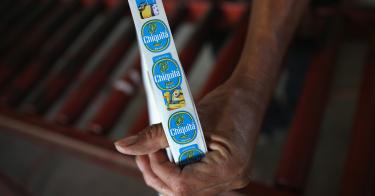The United States entered into the North American Free Trade Agreement (NAFTA) a quarter of a century ago. The historic pact eliminated tariffs on 99 percent of goods traded within North America, and Americans have reaped tremendous benefits ever since.
On average, U.S. businesses have added more than a million new jobs each year. Manufacturing wages have risen, and the U.S. continues to be a magnet for foreign investment. Between 1994 and 2018, the U.S. attracted nearly $5 trillion in total investment from abroad — money that has helped support American jobs and communities.
But these trade-fueled benefits may soon start to dry up if President Trump makes good on his recent threat to slap tariffs of up to 25 percent on all goods from Mexico.
In a bid to prod Mexico into taking serious action to halt the influx of people entering America illegally, Trump says he will start placing a 5 percent tariff (i.e., tax) on all imports from Mexico, effective June 10.
But taxing American consumers and businesses is no way to settle immigration policy disputes with our neighbors. Tariffs and immigration are distinct issues that should be managed separately.
What happens if the tariffs take effect? Right away, it will raise the price of many goods, from fresh bananas (currently tariff-free) to auto parts (currently subject to only a 2.5 percent tariff, but zero under NAFTA).
And if the immigrant influx continues, Trump says he’ll ratchet the tariffs ever-higher. After four months, he warns, all Mexican goods will be taxed with a 25 percent tariff.
It will be as if NAFTA never existed.
Tariffs on Mexico will have immediate costs to American businesses, as well as short- and long-term costs to American workers and their families.
In addition to the tariffs themselves, the earliest costs will likely arise from increased bureaucracy and paperwork at the border. American and Mexican companies can count on a debilitating slowdown in processing imports at ports of entry. Customs and Border Protection (CBP) staff available to review paperwork will no doubt be in short supply.
CBP has already experienced staffing shortages, and the transport of goods across the border has already reportedly slowed as the immigration crisis has forced the agency to dedicate more and more staff to managing that challenge.
Delays at the border are not merely inconvenient. Many goods traded between Mexico and the U.S. are “just in time” products. This includes parts for automakers in the Midwest and fresh produce and meats for local grocery stores across the country.
If automobile parts arrive late, production is delayed and automakers could be forced to fly in parts that would otherwise arrive by truck or rail — significantly increasing transportation costs and ultimately the cost to manufacture a car. Local grocery stores would face a similar decision, or fresh produce and meats could go bad while they are in transit.
Some would argue that the difficulties associated with importing will result in manufacturers moving production back to America, or grocers sourcing more food locally. While that could happen in the long run — meaning several years down the road — the reality is that these tariffs will reduce competition and increase costs for everything — from avocados and nuts to computers and semiconductors.
Not only would the tariffs make cars and car parts more expensive, they would make it more expensive to drive. The U.S. imports as much as 700,000 barrels of oil each day from Mexico. As tariffs rise, so will fuel and household energy bills.
Mexican retaliation is also a concern. Mexico has yet to release a list of American products it will hit with tariffs, but its response is likely to be painful — as it was for American pork producers during the steel and aluminum tariffs.
Free trading has been a boon for workers and consumers in both the U.S. and Mexico. Raising tariffs to pre-NAFTA levels — and even higher — is the economic equivalent of shooting yourself in the foot. It’s a clumsy and damaging tactic ill-suited to resolving the immigration crisis. The Trump administration should abandon this ploy and resume working to lower trade barriers in North America.
This piece originally appeared in The Detroit News



